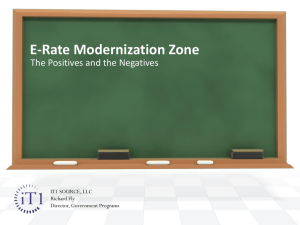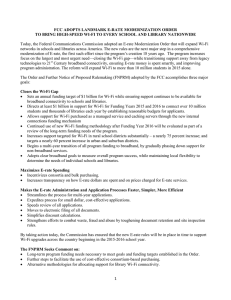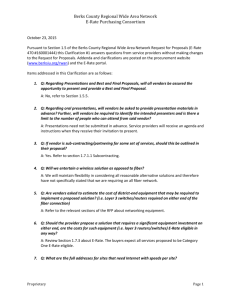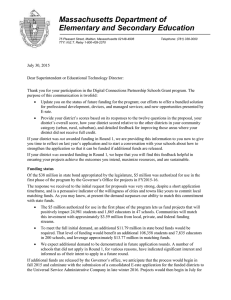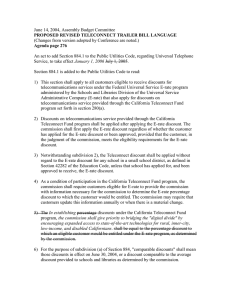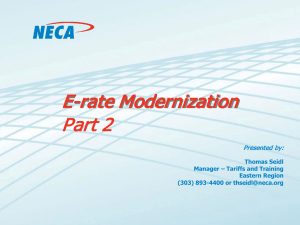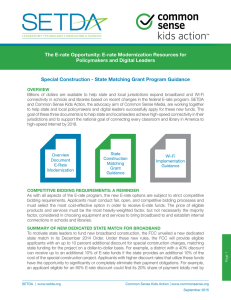PowerPoint slides for superintendents
advertisement
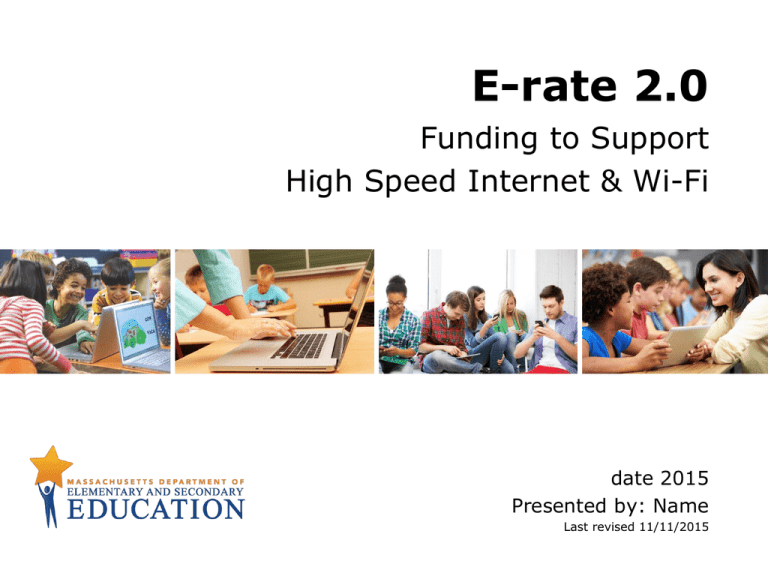
E-rate 2.0 Funding to Support High Speed Internet & Wi-Fi date 2015 Presented by: Name Last revised 11/11/2015 More and more educational resources in the cloud. Desirable Destinations Pedagogical shifts in teaching, learning, & PD. How well is your district reaching the cloud? What’s driving your technology purchasing decisions? 2 More Devices Students may have devices, but how many of them will be able to reach their destinations on time? 3 4 More devices and content requires more bandwidth & Wi-Fi. Resources and tools are only as good as the network they run on Is your district ready? Where will you get the money? 5 6 E-Rate 2.0 2014 FCC Modernization Order: new game, new rules, more funding for all schools. Focused on Wi-Fi and broadband services for ALL school districts. 60% increase in funding to $3.9 billion annually. All schools receive a budget of $150 per student for next 4 years. Funding depends on the district discount. But you must apply to receive funds! 7 How Much Category 2 Funding Can a District Get? If a School has 500 students, its budget would be $75K ($150x500). A district with a 40% discount would receive $30K for Category 2 WiFi. Blackstone Millville Regional School District, a rural district with 1,775 students and 50% discount, has applied for ALL of its funding – $133,135. Fitchburg Public Schools, an urban district with 5,041 students and 85% discount, has applied for almost all of its Category 2 funding. Wayland Public Schools, a suburban district with 2,659 students and 40% discount has begun to apply for its funding. Districts in MA are eligible to receive 4085% in funding. 8 The New Category 2 Funding Estimator! This Category 2 Funding Estimator tool was developed by TECedge in partnership with the MA Department of Elementary and Secondary Education for Massachusetts districts. Category 2 Funding Estimator 9 “For most MA districts, this will be the first time they can get E-rate funds for Wi-Fi network infrastructure. It’s like a sale on Wi-Fi ranging from 40% to 85% off.” -Stephen Kelley, TECedge 10 Getting Local Funding Work with your school committee and municipal officials to identify local share of funds. Start in the fall in order to complete the process of filing an application for funding in March. Negotiate with town/city to use reimbursements for school technology. 11 The New Recommended Bandwidth Tool! This Recommended Bandwidth Tool was developed by TECedge in partnership with the MA Department of Elementary and Secondary Education for Massachusetts districts. Recommended Bandwidth Tool 12 Benefits of E-rate 2.0 Funding Faster Wi-Fi and Internet for ALL classrooms. Opportunity to rethink delivery of teaching, learning, and professional development. Leverage technology for communication and collaboration. Makes cloud applications and websites faster. Strengthens 1 to 1 and/or bring-your-own-device (BYOD) initiatives. 13 Changes in Subsidies E-Rate 2.0 funding supports a major focus on FCC priorities: increasing Broadband and Wi-Fi to increase internet speed. To fund these efforts, the FCC is eliminating subsidies for phones, cell phones, web hosting, email, and voicemail. Biggest fiscal impact is phase out of phone/cell phone subsidies. Potentially a large impact on budgets. 14 Mitigating Loss of Phone Subsidies Explore alternative technologies such as Voice over IP (VoIP), which is often less expensive than traditional phone service. Proactively examine phone and cell phone contracts, reducing quantities if possible. Conduct “mini bid” for land line and cell phones under state contract ITT46, using price as the primary award factor. 15 Don’t Miss Out! So far, 110 out of 404 MA districts applied for Category 2 funding! Identify E-rate support: • Use internal staff. • Hire a consultant. Determine how best to reap the rewards of this critical program. 17 Further Information Filing Deadline: March 2016 tbd by FCC (for 2016-2017 projects) USAC Website (USAC Search Tools) ESE E-rate Site ESE E-rate Video For more information: odl@doe.mass.edu 18
